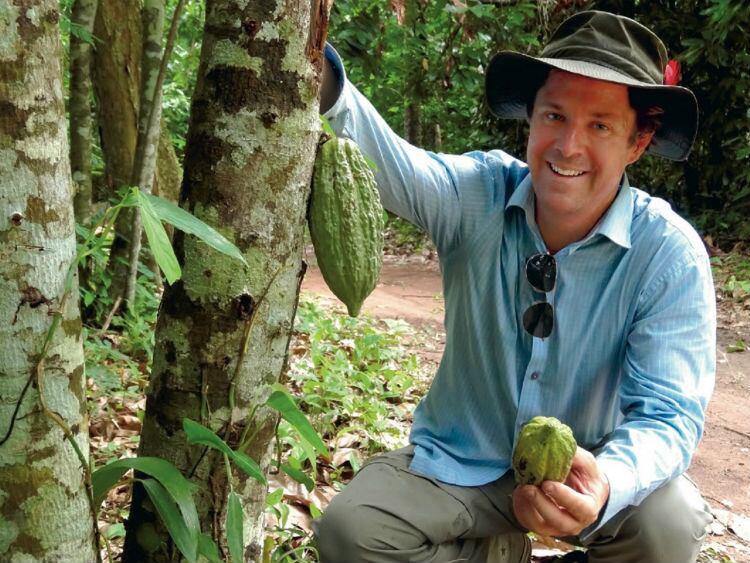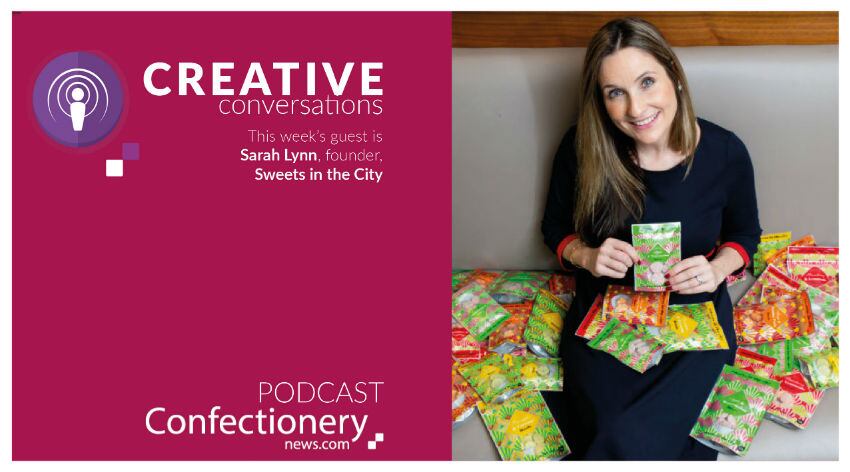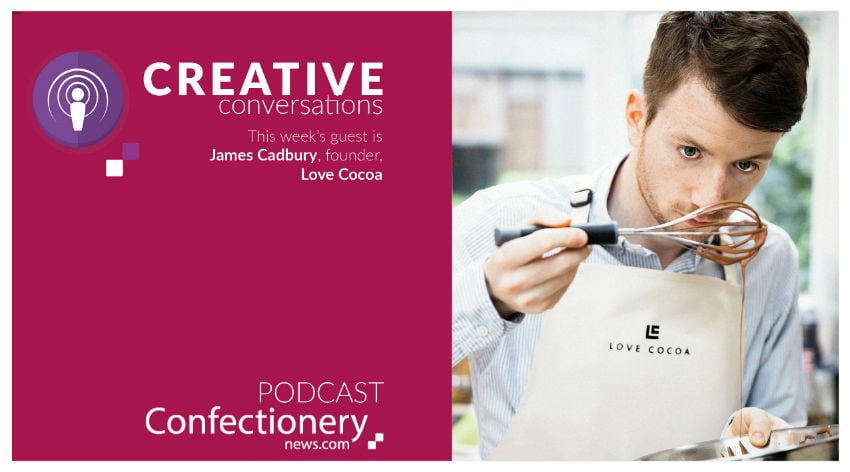Name: Philipp Kauffmann
Job title: Founder/Chief Grower
Company: Original Beans
Website: originalbeans.com
Twitter url: twitter.com/original_beans
Linkedin url: https://www.linkedin.com/in/philipp-kauffmann-58660/
Tell us about your job/company/role?
Original Beans is the regenerative chocolate company with the motto to preserve what’s rare and the commitment to grow one tree for every chocolate you buy. Since 2008, the Amsterdam-born company supplies the world’s leading restaurants and retailers with rare organic chocolates that are nature-preserving, waste-free, and climate-positive.
Each of the Original Beans varieties of chocolate has a story to tell. There are nine varieties of chocolate in 70g bars and nine varieties available as couverture for chefs along with nibs and buttons.
Original Beans One Bar: One Tree programme has grown millions of trees in the cacao territories to give back to the earth what we consume. The tree planting efforts are carefully coordinated to empower growers, their families and protect endangered wildlife.
Original Beans measures progress in becoming a 100% regenerative company with a unique monitoring system in collaboration with PwC and CarbonRoots. Measurements are made locally then collated at headquarters in Amsterdam and reported through a tree tracker and chocolate footprint.
The company pays growers the right price for top quality produce. Stable, fair prices for growers offer cacao growing families incentives for quality and sustainability with more security for the future and a way out of poverty. Original Beans supports 175 full time farming families and 5,000 part-time farming families. No cases of child labour have been reported just empowerment of young growers, including females.
Original Beans goes further than Fairtrade and other certifications which add 5-10% on to cocoa prices as the unique Chocolate Footprint shows it rewards growers with the right price to achieve far better and wider results.
Since launching in 2010, Original Beans products are delivered CO² negative products to wholesale customers. It is achieved through a climate conscious supply chain, reducing CO² emissions at every step. The largest climate cost of Original Beans chocolate comes from tiny organic cacao farms from the natural N²O emitted during the composting of leaves twigs and pods. But the cacao farms are also where the great climate surplus happens through the trees that breathe in and store CO².
I dislike the corporate grand talk of change that is rarely met by sincere action. I feel sad about the amount of public goodwill, subsidies and airtime the confectionery multi-nationals receive without standing up to protect our health, our farmers, our planet.
Of all the chocolate, the milk chocolate requires more CO² to be made, because of the number of ingredients. The scientific CO² assessment of Esmeraldas cacao gardens reveals 9.5 stored tonnes of CO² per hectare each year. This once offset results in a climate surplus of 122g CO² per 70g Esmeraldas Milk chocolate bar.
Original Beans offers a direct forest protection agreement with the growers which are independently audited. The climate forest certification takes 3 steps: Calculation, Compensation and Communication. Original Beans helps an organisation to calculate its carbon footprint, i.e. emissions. It has a ‘CO² Quick Scan’ tool for CO² measurement involving operations like office spaces or personnel travel. Once the carbon footprint is calculated, the amount and costs of the certified offset is determined. Then it supports the Certificate Holder in communicating their climate leadership and investment in an Original Beans “Climate Forest”.
What drew you to working in the confectionery industry? (Apart from the free chocolate!)
I represent the seventh generation in a family of recognized nature explorers and nature conservationists. In 2008, I gave up my job at the United Nations in New York to pursue my dream of growing a 100% regenerative company that returns more to nature than it takes.
Looking at regenerative business models I realized that healthy forests are the answer to many futuristic challenges: malnutrition, extreme weather, species extinction, even poverty and conflicts. I remembered my forefather Georg Hartig’s advice in 1794 to manage forests in such a way that future generations can enjoy them in the same way as we do today.
There is really no tree product more charismatic and regenerative than cacao. And looking at the confectionery industry I realised that the discovery of cacao still lay ahead for the industry, the consumer and our entire culture of sweet treats. That’s how we started a company that after 10 years in business holds perhaps the most in-depth knowhow on cacao in the entire industry.
What do you love most about your job?
What inspires me time and time again is our chain of value. As an economist by training, I studied value chains. As an entrepreneur, I appreciate and foster the alignment of values among all people participating in our value chain. From the subsistence cacao grower in remote Eastern Congo to the very best chefs in the world, everyone involved in Original Beans subscribes to excellence, sustainability, and contribution as intrinsic values to go about their work and create a product that stands out in more than one way.
What do you dislike most about your job?
I truly dislike the unethically low product standards of the confectionery industry. As an entrepreneur, I also dislike the corporate grand talk of change that is rarely met by sincere action. I feel sad about the amount of public goodwill, subsidies and airtime the confectionery multi-nationals receive without standing up to protect our health, our farmers, our planet. Want to make the chocolate industry good? Then ask consumers to pay more. Want to make consumers pay more? Then offer better product and added value. Want to offer a better product and added value? Then pay growers more to make better cacao and use less sugar and other additives. It’s really that simple.
What is your biggest creative achievement so far?
I think we have done quite a lot in terms of innovations in the chocolate industry. We were the first to go after rare cacaos and source and produce them in a strategic manner. We were the first to grow traceable trees per product unit through our One Bar: One Tree programme. We were the first to launch garden-compostable packaging for our retail bars reducing the negative impact on the environment and human health by 82% compared to conventional chocolate packaging. We were the first to inset all emissions in our own supply chain to offer a fully CO2-negative, climate-positive product range. And we were the first to measure impacts in a systematic way to come up with a Chocolate Foodprint which quantifies our main sustainability measures in a simple, concise overview. And there is so much more to do! Right now, we are fighting Ebola among our cacao growers in Eastern Congo through raising awareness and distributing hundreds of hand-washing kits. The Amazon is burning, and chocolate could play a vital regenerative role in this region. What I am saying is that our times require creativity every day and every hour. As we always say: stay full of beans!
Where do you see yourself in five years’ time?
Our vision is to grow the most compelling contemporary food brand in harmony with nature. We have outlined ambitious growth plans for the coming five years and in our world that always means more chocolate, more forest, more climate. What I would love to see is for the world’s leading chefs to organise even more actively as a movement for change. And for our customers to engage even deeper to preserve the world’s rarest places. That movement is at the heart of our coming five years.
Describe a typical workday.
I don’t have typical workdays, since our company requires work along the entire chain, from the rainforest to the chef’s table. And so, I am back and forth all the time. My role, which we call Chief Grower, is to inspire and encourage our team, our partners, our customers. So, one day, I am in the bush, another day in the production, and then in the kitchen or the boardroom. It’s quintessential for a CEO to know and be aware of all details of the business by experience.
What do you enjoy doing outside of work?
I live close to the beach with my family and whenever we can, we are in nature, the dunes, the ocean. Running, swimming and lots of yoga keep me in balance. I love music, but rarely get time to pick up my saxophone. Family, friends, learning and laughing, and being grateful for it all.
What do you think will be the next big thing in the confectionery world?
There is but one thing and it’s BIG: get rid of cheap sugars. In what’s currently called confectionery chocolate that means cranking up the cacao content in products. This trend that has been going on for many years and is about to enter the market mainstream. At Original Beans we have always seen our chocolate mission as presenting and preserving the world’s rarest cacaos. There are hundreds if not thousands of distinct cacao varietals waiting to be tested, tasted and cultivated. Along the way, we all will learn how to appreciate chocolate as a natural food with all its complex flavours and deep health effects.
Apple or Android?
Android. I have never forgiven Apple that they haven’t led on sustainability.
What is your favourite book or podcast?
Many favourites, so much to learn, so much to marvel at. If I had to single out one for now, I’d pick Kim Stanley Robinson’s writing on possible futures of humankind. Written with impeccable detail and in an optimistic, humane spirit.
Where do you stand on social media – can’t live without it, or an evil necessity?
I think we have to view social media as the formation of our collective brain. Not necessity, but destiny, in one form or the other. As with the formation of a juvenile brain in a child, it requires rules, restrictions, and best practices from the parents. Who is taking the parental authority in this cognitive evolution? That’s what we urgently have to figure out. I hope that new political parties will form soon on the important issue of digitalisation.
If you could change one thing in the confectionery industry, what would it be?
Prices. The run for the cheapest calories in cheap packaging is not what the world needs right now.
What’s the biggest misconception about working in confectionery?
That it’s a fun industry. Confectionery is not fun right now. It largely lacks purpose, soul, and craftmanship. But I am convinced they will return, bottom-up, as revolutions always do. I see a lot of craft returning and I hope what you would call the industry is open and welcoming to this new third wave.
What advice would you give to other people looking to get into the confectionery industry?
Start with the craft, not with the business. Start with soul, not with salary. Start with purpose, always.
Time’s up! Thank you Philipp.
- CREATIVE CONVERSATIONS is Confectionery News’ online series profiling influential people working in the confectionery industry. We want to discover what makes you tick and to inspire others to follow your path.
- Please contact CN editor Anthony Myers to put yourself or a colleague forward.




